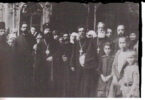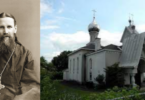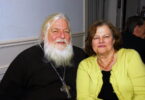His Eminence Archbishop Mark (Arndt), First Deputy Hierarch for His Eminence Hilarion, Metropolitan of Eastern America of the Russian Church Abroad and New York, is Overseer of the Russian Ecclesiastical Mission in the Holy Land and the head of the ROCOR parishes in the British Isles. In the 1990s, Vladyka Mark was the first bishop of the ROCOR who entered into a dialogue with the representatives of the Moscow Patriarchate. His is the chairman of the committee on Church Law at the Inter-Conciliary Assembly. This article provides an overview of the conversation recorded for the portal “Bogoslov.Ru”
Your Eminence, to what historic period would you compare what the Russian Church is going though now? And on the same note, how do you think the faithful and especially the clergy should react to the military actions happening in Ukraine? What historic parallels can we pinpoint at the present time regarding what the Russian Church is going through?
The Russian Church has always, for many centuries, been compassionate toward what’s been happening in Russian society. Be it internal civil conflicts that took place from the beginning of Kiev’s Rus’ and only calmed down after the Great Prince of Moscow, who appropriated this title, came to power and strengthened the State. Nowadays, as aftermath of the Soviet oppression, we see conflicts happening again. We can’t fully comprehend this, living outside of Russia.
What kind of attitude should we, living outside of Russia, have toward Russia’s internal and foreign affairs?
Of course, we should follow what’s going on in Russia, the Church and the society. But first and foremost, we should be concerned with matters of our own salvation and of the faithful around us.
In your interviews given in Russia you have mentioned that Russia is avoiding facing the reality of its own history of the XX century. It seems that the emigre community is doing well and is not very concerned about it. What common misconceptions among the Russian Church emigration have you noticed? What should we be doing differently? What internal conflicts with our common past do we avoid to talk about?
Well, the emigre community is not uniform. There were three waves of emigration and they vastly differ from one another. So we can’t really talk about the emigres as if they were one homogeneous fellowship.
What does remain, or at least did, I’m not sure, as a backbone of the emigres in our parishes is a deep sense of community. Here in Europe it’s becoming scarce, because people don’t understand its value.
So for the most part you see a sense of community in parishes that always had a strong backbone and kept passing on its values, and praise God for that. But it’s apparent how difficult it is to instill that sense among our newly arriving brothers and sisters. They are not familiar with it and it’s difficult. The Soviet regime, which was very successful in crushing initiative thinking, succeeded in destroying this notion of community. The people who chose to go to church during those times had to go to different parishes, they could not have a vital fellowship among them, it was impossible. And now it’s all coming back like a boomerang, we are losing this sense of being one body. In a spiritual sense, many parishes resemble gas stations, where you can come get a tank of gasoline and be on your way. We have to strive hard to rekindle our traditional approach to spiritual and church life because without this inner essence spiritual life cannot prosper.
What kind of pastoral issues were there connected with the first emigration? What was its attitude toward the Church?
In my time I encountered very few from the first emigration. For the most part our parishioners were the ones who arrived during the World War II. One thing was clear regarding the first emigration: they became believers after leaving Russia. There is a similarity there with what’s currently happening.
Interesting.
Yes. Among the first wave of emigres there were very few who involved themselves with the Church. Of course, they all considered themselves Orthodox Christians since the beginning of time, and would sacrifice their lives for the cause of Orthodoxy, but somehow they deemed it unnecessary to go to church; maybe once a year was enough for them. There were members of aristocracy, some characters depicted in Russian literature. The second wave of emigres sort of stimulated the first one to become more involved. Even though they were less knowledgeable regarding the Church matters (being brought up during Soviet times), nevertheless the time of war seemed to have united everyone, around the Church particularly. So I think that was a positive influence.
Synthesis?
Yes, in the beginning there were some issues between the first emigration and the newcomers, right after the war. I was especially concerned that their children would not go to church. Why, I have no idea. I guess the language barrier might have something to do with it. The first generation tried very hard to keep alive the Russian language. But to the younger generation, who were brought up here, speaking Russian becomes something abstract. So a complete absence of local language at the church services might have contributed to alienation of the younger generation from the Church. I, for one, insist on reading the Gospel and the Apostles and one of the great litanies, in two languages; because I want the children to hear a familiar language, far more understandable to them than Church Slavonic. It’s our fault that we don’t put enough effort in teaching the children to speak Russian, and at least comprehend Slavonic. It’s not successful everywhere. First of all, of course, it’s the Sunday school’s duty. Maybe it’s only one side of the coin, but still. Why did they stop coming? I can’t tell with certainty. It’s very sad. Next thing we know: someone is on a deathbed. Only then they finally need the church.
Let me tell you what happened last Saturday. A certain man, who hadn’t come to confession or communion for decades (even though his mother and wife do so regularly), was dying of cancer. I promised them that I’d come see him when I return from America. But when I came back he was already in such a bad shape that he couldn’t do anything. So tragic, utterly heartbreaking.
Your Eminence, do you think that perhaps the Church is viewed as a thing of the past due to a prevailing church-opposing mentality in our society, where church-goers are regarded to be almost in the same ranks with fascists?
Yes, could be. The young people often mention that they are looked upon as odd at school or university when they tell someone that they go to church. But you’ve got to have courage and stand for what you believe in.
Then the clergy must be supportive and thoroughly explain why it’s necessary. Even if you’re is born into an Orthodox Christian family (could’ve been Muslim, or anything), you still have to express your own will to be a Christian.
Of course.
Your Eminence, what goals do you have for the Russian Orthodox Church Outside of Russia, are there any specific problems that need to be addressed? What is important for us right now?
Our Church is quite a diversified entity due to the fact that our parishioners live in numerous countries, and any country has some sort of impact on anyone settling there. So, be it Europe or America or Australia, there are always challenges.
We have a difficult situation in South America, where a group of priests took over everything. In my opinion, these people don’t understand the current state of the Church and society in Russia and abroad; they’ve lost touch with the rest of the world and are closed up in their present psychological mood. They have abandoned the Church, and that is the sorest wound in the body of our Church. The flock doesn’t have a choice. There is not a parish within five hundred or a thousand kilometers around and it’s hard on people. So apparently they haven’t been educated enough and seem to think since there are no other priests around, then we’ll go to this one. And that is a horrible wound and pain on the body of the Church.
Your Eminence, in 2006 a council took place that addressed the topic of our reconciliation. It seems there is a need for another council again, as there are so many unanswered questions. What are the objectives of the Church now that we’ve reestablished communion with other local churches?
His Holiness Patriarch of Moscow is in charge of the relationship with the local churches. Of course we have to pay attention to things that arouse questions or seem dubious with the only difference now that it is pertaining to the inner life of the Russian Orthodox Church.
Your Eminence, in this light I’d like to ask you about Inter-Council Assembly. Quite possibly the Church in Russia has even more questions and challenges than our Church. And it looks to me that Inter-Council Assembly resonates with the words of Metropolitan Vitaly (Ustinov): “We, the bishops, listen to the Church and respond to what we hear in a transformed way”. So what does the Russian Orthodox Church Outside of Russia achieve by participating in the Inter-Conciliar Assembly?
The commissions that were formed under the Inter-Council Assembly have clear tasks which were defined either from the beginning or afterward. Some commissions have been reformed, some were assigned other responsibilities, and some of the duties were transferred from one commission to another. All this however, is evidence of very dynamic work going on within our Church. The results of this work can form a point of reference for the decisions of Bishop Councils. Many of the pressing issues concerning the life of the Church in Russia are not relevant to us here, because we have worked out the solutions to these issues in the course of our lives abroad for the last few decades.
Could you give me an example?
I mean how the priests and bishops are provided for once they grow old. Here we sort these problems out our way, but it’s quite different in Russia, and the Inter-Council Assembly is addressing this issue. Beside that the Bishop Council should review the recommendations made by the Inter-Conciliar Assembly. And there are plenty of issues that are not relevant to us. For instance, the question of individual tax number is not relevant to us at all. It perceived differently here than in Russia. So, we can refer to the solutions they came up with in Russia on their own, but they are not going guide us. On the other hand, there are many issues for which we have already found solutions through experience here and that we can share with them. Whether they will use our expertise to make decisions is up to them.
What could be done to organize a similar conciliar fellowship in our Russian Orthodox Church Outside of Russia? In each parish there are people who are very empathetic with the Church, often are well educated in theology, but somehow I get the impression that these people are not invited. Could we possibly organize something similar to Inter-Council Assembly to unify active efforts between the faithful, the bishops and the clergy?
I think that in general our parish councils provide a sufficiently solid foundation for this. Although, apparently they are not always used properly. So there is a potential do a lot more, to focus these efforts and employ them at parishes and dioceses. And in this respect, I think there are still plenty of opportunities that we could use more effectively.
Your Eminence, does the Russian Orthodox Church need any more reforms? From what perspective should we look at this?
I think we are making adjustments regularly.
Namely?
Well, for example, these days we get around by cars and airplanes, and not donkeys. And when I travel, I read the service book on my computer. So we adjust our lives to take advantage of things that have become available.
I see.
It doesn’t change us, but changes the way we live, making it more simplified and organized.
Your Eminence, last question. Clearly a Christian’s life has its own stages, but sometimes you see people who’ve worked hard for the Church for ten or fifteen years and then they stumble, something goes wrong and that person becomes an outcast. Have you seen anything like this? How can we lend a helping hand to those who distance themselves from the Church?
We don’t want to force anyone to stay with the Church. We understand that people have their own will and freedom of choice. And if someone wants to align their own will with God’s will, Christ’s will, then we can help and assist. Or if that someone chooses otherwise, then all we can do is remind them of what is right, but we cannot force or pressure them or limit their free will, which by itself is a gift of God. Free will can be used either for good or evil. We can only remind such people that the path they have chosen is not right and will not lead to salvation. But we cannot force it on anyone.
Thank you, your Eminence, for taking time to speak with me.










